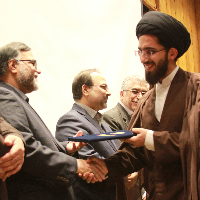An Investigation into the Causes of Identity Formation Challenges in Adolescents Navigating Both the Real and Virtual Worlds
Adolescence marks the beginning of an individual's conscious and selective engagement with their surrounding world and the organization of personal identity. With the increasing presence of adolescents in cyberspace, it is clear that the opportunities and threats posed by the virtual environment on the educational path of adolescents, particularly regarding their identity formation, stem from understanding the contexts and roots of the virtual space's influence. Given the growing and addictive use of cyberspace by adolescents and its impact on their identity dimensions, the identity formation of contemporary Iranian adolescents faces numerous challenges, including confusion, conflict, and identity doubt. The main question of this research is about the causes and contexts of the identity formation challenges faced by adolescents, which relate to cyberspace and the second life of contemporary Iranian youth.
To explore the causes of the identity formation challenges in the dual real-virtual space, this research employs thematic analysis. The primary aspect of using this method is to extract rich codes from interviews and studies. For this purpose, 500 relevant articles were identified, from which the top 50 were selected, and ultimately, the texts of these 50 articles were coded and thematically analyzed. Since the transformations and changes of the new generation are complex and rapid, especially the serious identity challenges that emerged during the unfortunate events of Fall 2022, there were insufficient scientific articles to analyze the latest developments. Therefore, interviews were conducted to supplement the research data. Interviews were held with 15 experts in sociology, psychology, ethics, educational sciences, culture and communication, cyberspace, and experienced managers in organizations related to the issue, discussing the main question of this research. The distinction and innovation of this research compared to previous studies lie in its focus on identity challenges and online identity formation. Methodologically, it combines relevant articles and interviews with experts, and in terms of results, it outlines a conceptual network of the causes and contexts of these challenges with a comprehensive perspective and 360-degree results. In the initial coding, over 112 rich themes (in terms of content) related to the main research question were extracted. Through three stages of categorization—initial categories, intermediate categories, and major categories—ultimately, under the axis of causes and contexts related to cyberspace, the identity formation challenges of contemporary Iranian adolescents were categorized into three major categories, with a total of 19 intermediate categories classified under these three.
The findings of this research indicate that the causes of identity challenges related to cyberspace can be divided into two general categories: 1. The inherent characteristics of cyberspace, which largely result from the direct consequences of communication and information technologies in their current form. 2. The manner of the subject's presence in cyberspace, regardless of their application and digital lifestyle. The inherent characteristics of cyberspace can be summarized as follows: the high power of media in shaping identity, the lack of real backing for the values of cyberspace, biased representations of reality, accessibility to harmful content, the potential for crisis creation and resolution, cyberspace as a realm of imagination, the blurring of the boundaries between reality and unreality, the multiplicity and diversity of semantic signifiers, and the absence of a superior central signifier, as well as the timelessness, placelessness, and borderlessness of cyberspace. The manner of the subject's presence in cyberspace can be summarized as follows: feelings of freedom and choice, a sense of knowledge, lack of opportunities for solitude and self-reflection, moral desensitization, and continuous rethinking and reconfiguration of online identity. These two causes largely refer to the nature of cyberspace and its effects on identity formation, and thus are valid worldwide; this is also observable in the referenced scientific studies by authors from various countries. These two issues, whether intentionally or unintentionally, challenge the pre-existing constructs of identity and identity formation, and it must be accepted that this human characteristic necessarily adapts itself to this space. Now, the question arises: what exact changes will occur in the constructs of identity and identity formation as a result of these transformations? In light of the third cause, namely "the predominance of the role of cyberspace in shaping the foundational identity institutions prior to the virtual age," the importance of the above question becomes more pronounced. The findings of this research provide a critical and active perspective for stakeholders in the ecosystem of adolescent growth and development, encouraging them to refine their understanding of the adolescent's situation and reconsider the roles of effective institutions in their identity formation process, thereby reforming their approaches, strategies, and solutions. Keywords:Theme analysis, virtual space, teenagers, identity, identification.
-
Goals and Functions of Islamic University from the Perspective of Islamic Jurisprudence
Mohsen Davoodabdi *, Taghi Mousavi, Sajad Farahdel
Bi-Quarterly Research Scientific Journal in Educational Jurisprudence studies, -
The Role of Cyberspace in Shaping the Growth and Excellence Ecosystem of Contemporary Iranian Teenagers
Mahdi Fadaei, Seyyed Mohammad Taghi Mosavifar *, Mohsen Davodabadi Farahani
Journal of Research Bulletin for Lifestyle, -
Analysis and evaluation of moral dilemma of false brothers in digital age parenting
, Mahdi Fadaei *
Quarterly Scientific Journal of Applied Ethics Studies, -
An Analysis of the Contemporary Challenge in Sciences Classification and How to Face It
Sayed Hesamoddin Hosseini *, Shamsollah Mraiji
The Quarterly Journal of Islam and Social Studies, -
Explanation of the theoretical model of Martyr Avini in the study of holy defense, as a model for the study of religious social phenomena
Sayyed Hesamoddin Hosseini *, Nematollah Karamollahi, Alireza Momen arani, asghar islamitanha
Religion & Communication,




